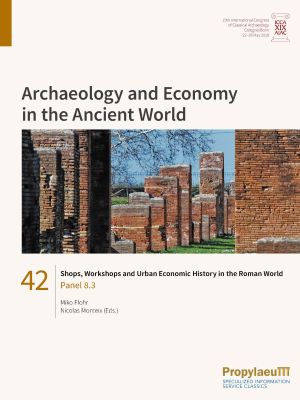
Zitationsvorschlag
Lizenz

Dieses Werk steht unter der Lizenz Creative Commons Namensnennung - Weitergabe unter gleichen Bedingungen 4.0 International.
Identifier
Veröffentlicht
Shops, Workshops and Urban Economic History in the Roman World
Panel 8.3
Die materiellen Überreste römischer Läden und Werkstätten im urbanen Kontext spielten in der klassischen Archäologie lange Zeit eine marginale Rolle, doch in den vergangenen Jahren erfreuten sie sich einer deutlich gestiegenen wissenschaftlichen Aufmerksamkeit. Beeinflusst durch Debatten über das Wesen der antiken städtischen Wirtschaftsstrukturen begann die Forschung ab den späten 1990er Jahren die archäologischen Beweise für den städtischen Einzelhandel sowie die städtische Produktion mit einer neuen und stärkeren Intensität zu untersuchen.
Seit der Jahrtausendwende haben Wissenschaftlerinnen und Wissenschaftler zunehmend damit begonnen, die Gestaltung von Läden und Werkstätten in Bezug auf gewinnorientierte Investitionsstrategien zu untersuchen und die Wirtschaftsgeschichte städtischer Gewerbelandschaften zu erforschen. Dieser Band diskutiert die Art und Weise, in der die Untersuchung von urbanen Läden und Werkstätten unsere Konzeptualisierung der städtischen Wirtschaftsgeschichte in der römischen Welt in Frage gestellt hat, und er untersucht mögliche Wege, um unser Verständnis des sich wandelnden Charakters des römischen urbanen Handels weiter zu vertiefen und räumliche sowie zeitliche Distanzen zwischen lokalen Zeugnissen zu überbrücken.






